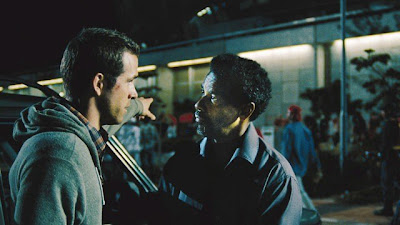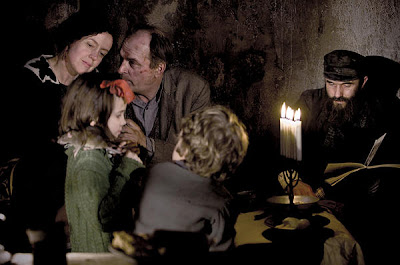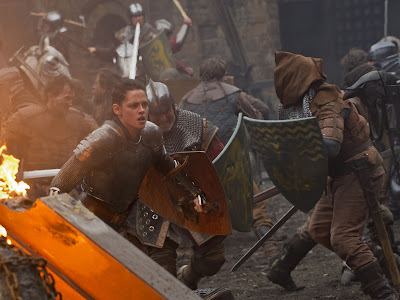Production year: 2010
Country: Rest of the world
Cert (UK): 15
Runtime: 157 mins
Directors: Nuri Bilge Ceylan
Cast: Firat Tanis, Muhammet Uzuner, Taner Birsel, Yilmaz Erdogan
Few films are about simply waiting and talking, but this is one; a film in which, for most of the time, nothing appears to be happening – but, in fact, everything is. Nuri Bilge Ceylan's new film is long and difficult, and perhaps not for everyone, but I can only say it is a kind of masterpiece: audacious, uncompromising and possessed of a mysterious grandeur in its wintry pessimism. Nothing in it reminds me of Sergio Leone, incidentally – unless it is that long, long wait at the beginning of Once Upon a Time in the West, with the keening wind-wheel and sighing desert. Actually, this has something of Antonioni, or Chekhov or even the later stories of Tolstoy.
The action extends over a single, rainy, sleepless night and into a grim morning at the workplace. A convoy of official vehicles, containing police officers, the state prosecutor, a medical examiner and guys with shovels are accompanying two prisoners out into the eerie expanse of the Anatolian steppe: the plain where Asia reaches west into Iran, Armenia and Turkey. The men are murder suspects, but are evidently about to plead guilty and, perhaps in a sentencing deal, have promised to lead officers to a body. One, Kenan (Firat Tanis), is all-important to the police, and this haunted wraith of a man is the centre of the film.
Their excursion started at the end of the working day, with everyone anticipating a quick discovery, but to the cops' fury, the prisoners become muddled; they can't remember exactly where the corpse is in the darkness. The quest continues into the deepest night, stopping periodically at likely-seeming spots, and at one stage, for a meal from a local mayor.
There is mostly nothing to do but talk, but the occasion inspires something other than ribaldry. When they see how heart-stoppingly beautiful the mayor's daughter is, they become thoughtful, solemn. Kenan is reduced to inexplicable tears. Mortality has become very real, as it always will, to any of us, in the middle of the night. And always the presence of that victim – out there somewhere in the rainy blackness – nags at their minds, exhuming dark thoughts. Ceylan shows that it has a sobering, clarifying, perhaps even ennobling effect.
The reason for the crime is never spelled out, although there is a discovery that casts a new light on Kenan's relationship with the victim. What is important is the ancillary, internal drama, the interactions between the careworn officials made possible by this deeply disagreeable task. Without the narcosis of sleep or work, they are forced to think about their lives, or perhaps about the fact that, in TS Eliot's words, they have nothing to think about. The handsome, distinguished state prosecutor Nusret (Taner Birsel) – a man who prides himself on his resemblance to Clark Gable — recounts an anecdote to the young doctor, Cemal (Muhammet Uzuner) intended to demonstrate that death can just come along and there's nothing we can do. But the doctor, a scientist and rationalist, questions his story in such a way as to open up a terrifying insight into the prosecutor's life.
Ceylan displays pure, exhilarating mastery in this film: it is made with such confidence and flair. In one shot, he shows us a tableau of five men in a car, two cops in the front, and between the two officials in the back, there is Kenan, his gaunt figure in darkness. The four law-mens' faces are illuminated in the faint flame-light, but Kenan's is just an outline: and Ceylan holds the shot, moving the camera forward just slightly, until it dawns on us how disturbing his silent presence is.
Perhaps his most quietly spectacular flourish comes near the end: a virtuoso moment. The doctor, exhausted after this punishing night, comes into his office and switches on his computer: he notices – as he must surely do every time – personal photos of himself. Ceyland enigmatically suspends the film's action just to show us these images. A series of stills fill the screen: the doctor as a young man, in love. There is something heartbreaking in it.
We are heading towards a terrible anti-miracle, as a discovery comes about the victim and a decision must be made about how much to reveal. We are witness to the jettisoning of Cemal's innocence, and the final loss of that refined, boyish quality that had intrigued and amused the cops during their long night: it has been his own rite of passage into the disillusioned manhood that everyone else joined a long time ago – police and murderers both. With his two early features, Distant (2002) and Climates (2006), Ceylan has showed himself a superb film-maker. This is his greatest so far.





















































